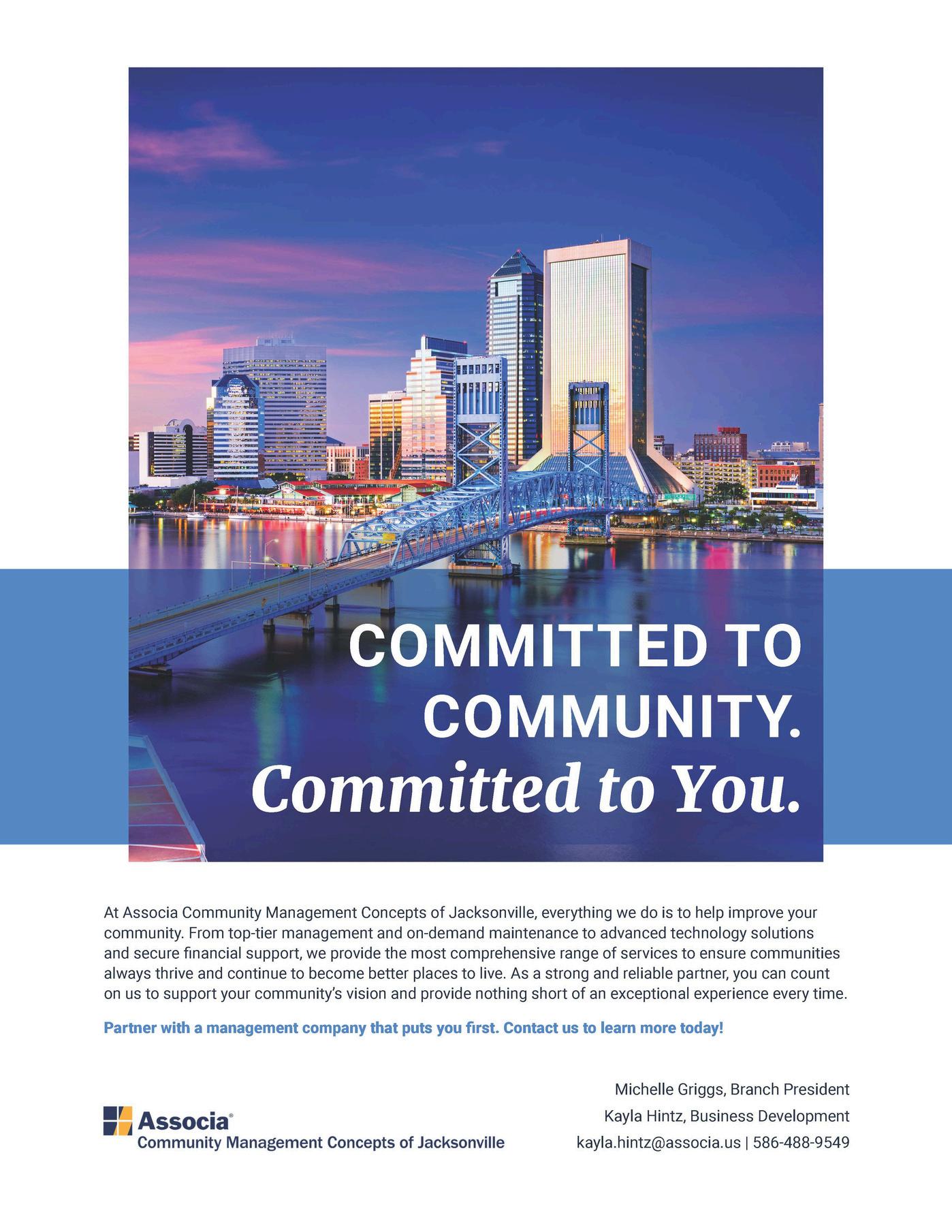

The The Community Community Connection Connection

CONTACT INFORMATION
10950-60 San Jose Blvd., #182 Jacksonville, FL 32223
ced@neflcai.com
2024 BOARD OF DIRECTORS
President - Zenzi Rogers Manager
Lennar
President-Elect - Kate McAdams, EBP
Business Partner
Performance Painting, Business Development
Treasurer - Alanda Williams
Business Partner
Manin Construction
Director - Jesse Martinez-Skinner, CMCA, AMS Manager
RealManage
Director/Past President - Leslie Pragasam Business Partner
First Coast Mulch
Director - Steven Sheremeta Manager
May Management
Director - David Bonewell Board Member
Villages of Vilano Homeowners Association
Chapter Executive Director - Jason Bee
NEFLCAI
UPCOMING EVENTS
June 21 - NEFL CAI EXPO “Propertyopoly”
July 10th - Monthly Program
Maggiano’s Little Italy 11:30 a.m.
NEFLCAI provides education, networking, resources, and advocacy for Community Associations in Northeast Florida and the professionals who serve them.
2024 COMMITTEES
Communications
Zenzi Rogers - Board Liaison
Tara Tallaksen - Chair
LAC (Legislative Action Committee)
David Bonewell - Board Liaison
Robyn Severs, Esq - Co-Chair
Pilar Dixon - Co-Chair
Membership
Alanda Williams - Board Liaison
Programs
Jesse Martinez-Skinner - Board Liaison
Ed Ronsman - Chair
Social
Leslie Pragasam - Board Liaison
Amy Newhouse - Chair
EXPO
Kate McAdams - Board Liaison
Brian Davis - Chair
GALA
Steven Sheremeta - Board Liaison
Stacy Montoya - Co-Chair
Joshua Donlon - Co-Chair
If you're interested in being on a committee for 2024, we'd love to have you.
Please reach out to our Executive Director, Jason Bee to get connected ced@neflcai com


(904) 396-0090 | www.flcalegal.com Years of Fruitful Community Association Advice McCabe & Ronsman is a full service law firm providing legal representation for condominium, homeowner, and cooperative associations throughout Florida. We provide timely, comprehensive assistance to associations at competitive hourly and flat fee rates. We further offer a variety of legal services on a contingency or advanced feebasis,thusprovidingfinancialflexibilitytoyourcommunity.
• Corporate governance, including attendance at meetings and amendments to governing documents
• Enforcement of covenants and restrictions
• Collection of delinquent assessments – Client portal offered at no cost to allow you to monitor active accounts 24/7
• Construction defect litigation
• Insurance claim litigation arising from hurricanes and other natural disasters Services Provided:
NEFL CAI Board of
Directors

Zenzi Rogers
Lennar
President Liaison to the Communications Committee

Alanda Williams Manin Construction
Treasurer Liaison to the Membership Committee


Leslie Pragasam First Coast Mulch
Director/Past President Liaison to the Social Committee


Kate McAdams Performance Painting President Elect Liaison to the EXPO Committee

Jesse Martinez-Skinner RealManage
Director Liaison to the Programs Committee

Committee Chairs
Tara Tallasken
Communications Committee
Chair
Vesta Property Services
Brian Davis EXPO Committee Chair
BMD Law Group PA
Joshua Donlon
Gala Committee Co-Chair
Ball Janik
Stacy Montoya
Gala Committee Co-Chair
Martex Landscape
Robyn Severs, Esq.,
Legislative Action Committee Co-Chair
Becker
Pilar Willis Dixon
LAC Co-Chair
Brown and Brown


Welcome To Our Newest Members!
Individuals
Megan Maldonado CAM, Greenpointe Developers
Dan Bloemer, Amelia Island Plantation Community Association
Fred Borakove, Amelia Island Plantation Community Association
Bob Carlisle, Amelia Island Plantation Community Association
Walter Cox, Amelia Island Plantation Community Association
Craig Goodall, Amelia Island Plantation Community Association
Michael Heintzmann, Amelia Island Plantation Community Association
Chris Kirwan, Amelia Island Plantation Community Association
Tracy McQuaid, Amelia Island Plantation Community Association
Judy Raggi-Moore, Amelia Island Plantation Community Association
Owen Williams, Amelia Island Plantation Community Association
Paul Dillard, Beau Rivage of Jacksonville
Jean Manz, Beau Rivage of Jacksonville
Michelle Griggs CMCA, Community Management Concepts
Derrick Mitchell, Sr., Northlake Homeowners Association
Erin Wells CAM, Priority Community Management
Business Partners
Dakota Plowucha, Davey Tree Expert Company
Emmanuel Matias, Freedom Community Management
Michele L. A. Rollins, Jimmerson Birr PA
Tim O’Keefe, KW Property Management and Consulting
Shane Dickens, Stonebridge Roofing, Energy, and Exteriors
Joel W. Meskin, Esq., CIRMS, The McGowan Companies
Ricardo Alonso, Atesa Risk Advisors


Mental Health Health Awareness Awareness Month! Month!

May is Mental Health Awareness Month, a time to bring attention to the importance of mental health and to promote understanding and acceptance of mental illness. Mental health is a critical aspect of our overall well-being, and it’s important that we prioritize our mental health just as we do our physical health.
How Can We Take Care of Our Mental Health?
Here are some tips for taking care of your mental health:
This Mental Health Awareness Month, let’s prioritize our mental health and encourage others to do the same. By taking care of ourselves and supporting those around us, we can create a more compassionate and understanding world for everyone.


Managing Bullies in your HOA
 by Marcy Kravit, CMCA, AMS, PCAM
by Marcy Kravit, CMCA, AMS, PCAM
The American Psychological Association defines bullying as “a form of aggressive behavior in which someone intentionally and repeatedly causes another person injury or discomfort. Bullying can take the form of physical contact, words, or more subtle actions.”
Unfortunately, it is all too common for bullying to occur in community associations. Board members and managers need support and guidance to handle these types of situations. Bullying is a form of workplace harassment and violence.
If the bullying is directed at an employee, it can increase the use of sick leave, increase medical costs, and cause employees to quit or request a transfer. Disgruntled homeowners who challenge the board’s decisions, harass board members, chastise the manager, and fight with residents have their own agenda and may be considered bullies.
There are many types of bullying. Verbal abuse is the most common and is extremely demeaning and degrading. These actions are dangerous to one’s self-esteem, causing anxiety, depression, and emotional and psychological harm. Cyberbullying can occur over email, social media, and digital platforms, and it can harm the association’s reputation and present potential liability.
What is the best way to address a bully? Here are some tips:
Talk with the bully face-to-face outside of a group setting. Take a positive approach, and communicate about specific unruly behaviors and how they adversely affected an employee, fellow board member, or resident. Explain how the behaviors impacted association operations. If you feel like you need it, bring a witness to support you.
Criticize the behavior and not the person. Ask questions. Find out why they are attacking and belittling. Explain that the board, residents, and management are working toward a common goal.
Discuss and stick to the facts. Try not to get emotional. Maintain composure, and address the behavior in a friendly, professional manner.
Create and adopt a code of ethics and board code of conduct. Require all to sign it and refer to it when an individual gets out of hand.
Review governing documents, human resources policies, and state laws. If the bully is on the board, you may have the power to remove the member or reassign them. If the bully is an employee, speak with them, document the conversation, and review the employment manual.
Board and resident bullies need to understand how their behavior affects the entire association. Homeowners have the right to complain; however, they should never disrespect the manager and the board. If a resident makes obscene gestures, is disruptive, or uses profanity, they should be subject to removal from a meeting, cited for violating governing documents, and possibly fined.
A resolution can be adopted if the governing documents do not outline specific provisions regarding unruly behavior. Contact your association attorney to assist with drafting language for a board code of conduct or adopting a resolution. If things are out of control, consider a cease-and-desist order.
It is important to respect differences of opinion and agree to disagree. You may not be able to change someone’s behavior, but you can set
boundaries to create a better environment that does not reward bullying or disrupt the association.
Civility Pledge
Community association boards are regularly faced with challenging and complex issues that can spark strong emotions. A critical responsibility of a board leader is to facilitate community conversation about these important issues. Community association boards can commit to embracing principles that establish a framework for effective community conversations by adopting CAI’s Community Association Civility Pledge.
Community association boards use this framework to lead their communities through conversations about difficult and complex issues and harmonizing feedback from residents resulting in decisions that are informed and well balanced for the community as a whole


Reducing Mental Health Stigmas Reducing Mental Health Stigmas and Prioritizing Mental Wellness and Prioritizing Mental Wellness
 by Hazel Siff
by Hazel Siff
The first step to reducing the stigma around mental health struggles? Understanding how common they are. According to the National Institute of Mental Health, 21% of U.S. adults struggled with a mental illness in the past year, including 25.8% of females and 15.8% of males over the age of 18. If you are struggling, you’re not alone. “You would never guess I had depression,” says Bill Overton, PCAM, of Desert Resort Management in Palm Desert, Calif. “We don’t talk about our weakness. We don’t talk about our mistakes.” Furthermore, he explained, the community management profession selects for high-performing depressives and people-pleasers. “Nobody thinks you’re depressed when you get stuff done.”
Mental health struggles have a financial cost The faster an organization burns through employees, the more often it must bring in new hires. Turnover is expensive. The human cost is even higher. According to the Centers for Disease Control and Prevention, suicide is the second leading cause of death among men between the ages of 20 and 30. And this is only one way stress contributes to health crises. Stress is a known contributor to many serious health complications, though this data is harder to quantify “Men don’t talk about it,” Overton expresses. “Successful men don’t talk about it. A lot of us are depressed.”
This industry, like many others, rewards high performance. Taking on the toughest assignments and refusing to ask for help is rewarded. The cost of performing so high, when doing so means ignoring one’s own health, is burnout. Depending on the severity, consequences can range from inconvenient to deadly. How can managers learn to handle both the workload and mental health? Start by creating a completely different level of awareness surrounding mental health. Everybody’s mental health is equally important,
and everybody needs to take regular care of themselves to maintain it. Some have struggled with mental illness for their entire lives; some will develop mental illness later due to external or internal factors; others will not face mental illness at all, but we all struggle with stress.
Every person owes it to themselves to learn what they need and to prioritize giving themselves those things. Every organization owes it to their employees to restructure working life, leaving room and support for self-care.
For some people, this might mean getting a mental health counselor, spending more time outdoors, getting more sleep, exercising more, adopting an emotional support animal, taking more time off work, opening up to a trusted friend or family member, or a combination of these. Knowing we are not alone, taking the time to listen to, support, and care for each other, is an excellent first step in prioritizing mental well-being.
“People change the subject a lot when someone tries to discuss their struggles,” Overton says. “Instead of just saying, ‘feel better,’ let’s talk about it.”
CAI’s new publication helps board members and managers use compassion and empathy to manage resident mental health and conflict. Visit, the CAI Press bookstore for more information.


 by Dawn Bauman, CAE
by Dawn Bauman, CAE
The unofficial start of summer is here. As we prepare to observe Memorial Day a day to honor those who died while serving in the U.S. military many HOA and condo residents across the country will display the American flag.
According to the U. S. Department of Veterans Affairs, the American flag should be flown at half-staff on Memorial Day from sunrise until noon. After noon, it can be raised briskly to the top of the staff until sunset in honor of the nation’s battle heroes.
CAI believes all Americans should have the opportunity to display the U.S. flag.
In July 2006, the U.S. Congress passed the Freedom to Display the American Flag Act.
The law states “a condominium association, cooperative association, or residential real estate management association may not adopt or enforce any policy, or enter into any agreement, that would restrict or prevent a member of the association from displaying the flag of the United States on residential property within the association with respect to which such member has a separate ownership interest or a right to exclusive possession or use.”
The law goes on to say –
“Nothing in this act shall be considered to permit any display or use that is inconsistent with: Any provision of Chapter 1 of Title 4, United States Code, or any rule or custom pertaining to the proper display or use of the flag of the United States (as established pursuant to such chapter or any otherwise applicable provision of law); or 1.

2. Any reasonable restriction pertaining to the time, place, or manner of displaying the flag of the United States necessary to protect a substantial interest of the condominium association, cooperative association, or residential real estate management association.”
Community associations may not prohibit the display of the American flag. Additionally, they aren’t responsible for enforcing guidelines for how to display the flag. We hope your residents enjoy a sense of community this Memorial Day as you collectively honor the fallen heroes who served our country.
Click here for more information about CAI’s U.S. flag public policy, sign and flag policy, related state laws, and legislative tracking on this issue.



Hurricane Preparedness



BEFORE JUNE 1
SAFFIR-SIMPSON WIND SCALE
WATCHES AND WARNINGS
2024 NAMES KNOW THE CONE
DAYS BEFORE A STORM
DURING/AFTER A STORM






Articles in this publication are courtesy of individual and company contributors and are independent views of that company.
As an additional sponsor benefit, click on each sponsor's ad to be taken to their website and learn more about their company.



Make an Evacuation Plan Make an Evacuation Plan
Develop a family hurricane preparedness plan before an actual storm threatens your area. If your family hurricane preparedness plan includes evacuation to a safer location for any of the reasons specified with in this web site, then it is important to consider the following points:
If ordered to evacuate, do not wait or delay your departure. If possible, leave before local officials issue an evacuation order for your area. Even a slight delay in starting your evacuation will result in significantly longer travel times as traffic congestion worsens.
Select an evacuation destination that is nearest to your home, preferably in the same county, or at least minimize the distance over which you must travel in order to reach your intended shelter location.
In choosing your destination, keep in mind that the hotels and other sheltering options in most inland metropolitan areas are likely to be filled very quickly in a large, multi-county hurricane evacuation event.
If you decide to evacuate to another county or region, be prepared to wait in traffic. The large number of people in this state who must evacuate during a hurricane will probably cause massive delays and major congestion along most designated evacuation routes; the larger the storm, the greater the probability of traffic jams and extended travel times.
If possible, make arrangements to stay with the friend or relative who resides closest to your home and who will not have to evacuate. Discuss with your intended host the details of your family evacuation plan well before the beginning of the hurricane season.
If a hotel or motel is your final intended destination during an evacuation, make reservations before you leave. Most hotel and motels will fill quickly once evacuations begin. The longer you wait to make reservations f ff l order has not been is less likely you are to f especially along inte metropolitan areas
If you are unable to no hotels/motels roo resort go to a shelte designed for comfort Bring your Disaster S the shelter.
Make sure that you you leave.





2024 Atlantic hurricane season could be among most active on record, experts say
By Debbie Lord, Cox Media Group National Content Desk
The 2024 Atlantic Hurricane season could be a record-setter, according to forecasters as a report released last month calls for 23 named storms to form this year. “We anticipate a well above-average probability for major hurricanes making landfall along the continental United States coastline and in the Caribbean,” researchers from the Colorado State University Tropical Meteorology Project said in a 44page report. According to the report, activity in the 2024 season will rise considerably above the 19912020 average, with researchers predicting 23 named storms and 115 named storm days.
Named storm days count all tropical cyclones with winds of at least 39 mph. Previous years had an average of 14.4 storm days and 69.4 named storm days, the report noted. Forecasters pointed to a combination of intensified La Niña conditions – a phenomenon that causes decreased vertical wind shear that aids in hurricane formation – and warmer than usual sea surface temperatures as the reason they are predicting such a jump in the projected number of tropical systems. The La Niña effect is expected to intensify in late summer, the most active time for hurricane formation.
The report said there is a 62% chance of a Category 3, 4 or 5 hurricane making landfall on the continental U.S. coastline. In an average year, the prediction of such a strike is 43%. Category 3, 4 and 5 hurricanes are considered “major” hurricanes by the National Hurricane Center. A Category 3 hurricane has sustained winds of between 111-129 mph; a Category 4 has sustained winds of 130-156 mph; and a Category 5 storm produces winds of more than 157 mph. Researchers say that along the East Coast, the probability of a landfalling hurricane is 34%. The report says there is a 42% chance of a hurricane hitting somewhere along the Gulf Coast and Florida Panhandle. In average years, there is a 27% chance of a strike.
The Atlantic hurricane season runs from June 1-Nov. 30.


Is your HOA Prepared? Is your HOA Prepared?
With hurricane season starting, making sure your homeowner’s association is prepared to face disaster and help homeowners is crucial. The more prepared your HOA is, the easier it will be to minimize the damage and return to normalcy as quickly as possible.
1. Make Sure All Roofs Are in Good Condition
Schedule a professional roof inspection as soon as possible to make sure the roof is secure and in good condition. We recommend taking date-stamped photos of all roofs as well so you have a way to prove any damage that occurred as the result of a severe storm.
2. Create a “To-Do” List for Storm Warnings
Do you know what to do when you receive a warning of a potential disaster? If not, create a to-do list now. Include things like switching off pool pumps, distributing evacuation plans to residents, and moving elevators to higher floors to avoid flooding.
3. Check Your Insurance Coverage
If you haven’t looked at your insurance policy in a while, it’s always a good idea to take a look before disaster strikes. Make sure your policy limits are high enough to cover repair and replacement costs. You also want to ensure that you have the right types of coverage, like replacement coverage and flood coverage.
4. Help Residents with Disaster Prep
Put together a comprehensive list of emergency resources and items homeowners should have in their possession in case of disaster. A few things to put on the list include:
Proof of residency
Social Security card
Passport
Credit cards
Cash Prescriptions
5. Discuss Disaster Planning
Insurance policies
Candles and lighters
Bottled water
Non-perishable food
Flashlights (with extra batteries)

Every homeowner’s association needs to have a documented disaster plan. This is especially important in places like Florida where there is a potential for extreme weather like hurricanes. Having a detailed plan in place and discussing it with your residents ensures that everyone will know what to do in the event and in the aftermath of a major storm or other disasters.




NEFLCAI - 2024 Platinum Sponsors
Click their logo to go to their website.




NEFLCAI - 2024 Platinum Sponsors
Click their logo to go to their website.




NEFLCAI - 2024 Gold Sponsors
Click on their logo to go to their website.








NEFLCAI - 2023
Click on their logo to go to their website.









NEFLCAI
- 2023 Bronze Sponsors
Click on their logo to go to their website.




